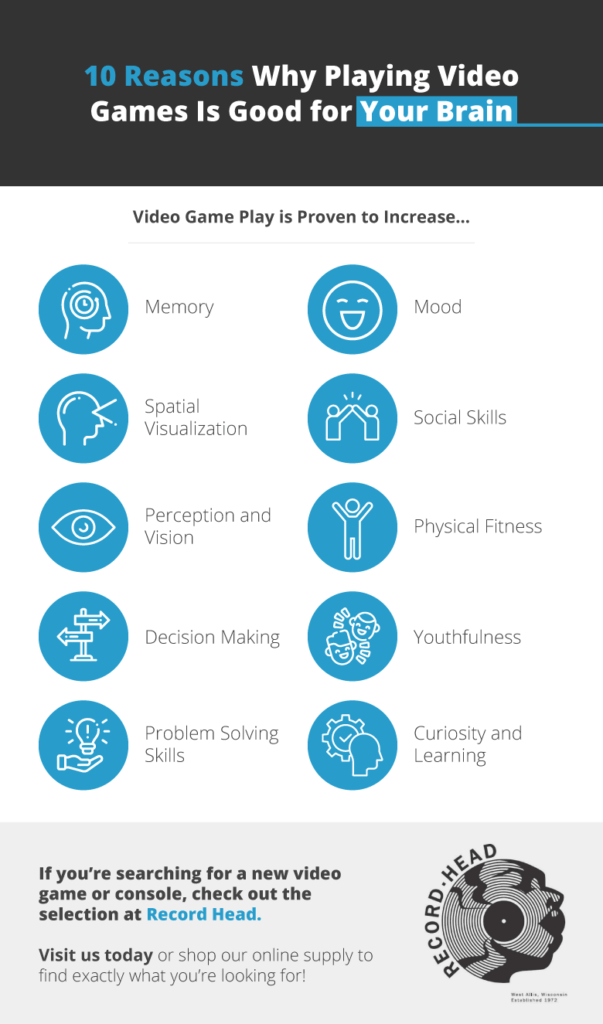
From action-packed shooter games to challenging strategy games, we love a good video game. As technology advances and game developers keep creating fresh content, there seems to be a new game to try every day. Luckily for gamers like us, there are many benefits of gaming that will encourage you to keep playing — as if you needed another reason. Many games also feature incredible soundtracks that inspire players to explore a music collection of their own.
The positive effects and advantages of video games are numerous, from better memory and problem-solving to improved mood and social skills. While those who don’t play video games may argue that they make you lazy, harm your brain or ruin your social life, video games actually have many physical, cognitive and social benefits. The next time someone tells you that you play too many video games, you can turn to this list of 10 reasons video games are good for your brain.
1. Memory
Many video games require some serious strategy and concentration. If you have ever built your own civilization in Minecraft or fought for your life in Fortnite, you know how important it is to remember where you found specific resources or where you need to go next. With 3D graphics and immersive audio, video game environments are extremely rich in stimuli. Navigating the virtual world of video games is now very similar to navigating the real world. In fact, exploring video game universes can have a positive impact on memory in your everyday life.
When you must juggle multiple tasks and goals while navigating a virtual space, you are exercising your hippocampus. This is the part of the brain responsible for converting short-term memory to long-term memory, as well as controlling spatial memory. When you keep your hippocampus in shape, you will see improved long-term memory and be better at navigating physical space. If you are prone to getting lost on your way to the store, video games may be able to help improve your memory for directions.

A study supported by the National Institutes of Health found that out of 2,000 kids, those who played video games for three hours a day or more did better on tests measuring cognitive skills like working memory than kids who didn’t play. Brain scans showed those who played video games had more brain activity associated with demanding tasks than those who didn’t. These patterns may relate to impulse control and memory associated with playing video games.
As a person ages, their memory naturally declines. Regular video game play may be a great way to keep your mind sharp even as you get older, so you will always be able to find your car in the parking lot or remember how to get to your friend’s house.
2. Spatial Visualization
On top of improving your spatial memory, playing video games also helps you visualize space better. Studies show that gamers who play video games with 2D graphics see an improvement in mental rotation, while gamers who play games with 3D graphics see an improvement in spatial visualization.

This enhanced spatial visualization has practical benefits, like knowing whether you will be able to parallel park in a tight spot or organizing your closet, so everything fits. Good spatial visualization is also essential for success in many STEM careers.
3. Perception and Vision
When faced with a complex environment with competing stimuli, your brain creates a perceptual template that helps you determine what is important and what is not. This perceptual template enables you to assess and respond to a situation. According to a 2014 study published in Proceedings of the National Academy of Sciences of the United States of America, playing action video games can improve a person’s ability to create perceptual templates. This type of improvement in perception is especially beneficial, as it is not task-specific but can apply to any situation.
High-action video games can also improve your ability to distinguish patterns and different shades of gray. Scientists used to believe your ability to distinguish contrast was not something that could improve, however, research from the University of Rochester showed gamers who played about 5.5 hours of action games each week for nine weeks showed a 43% improvement in their contrast sensitivity.
The gamer’s brains were able to process visual stimuli more efficiently, and this improvement in perception lasted for months after the experiment ended. This improved perception has valuable real-life benefits, such as being able to keep track of your friends better in a crowd or find something you have dropped in the grass.
4. Decision Making
Fast-paced video games like Need For Speed or Call of Duty require you to stay on your toes and make decisions quickly. These energizing action games can also improve your ability to make game-time decisions in real life. Research shows that one of the many benefits of playing video games is an increase in plasticity, or your brain’s ability to change in response to learning.
Playing video games lets you direct your attention toward a specific task and receive stimulation as you complete these challenges. Since your brain knows how to handle these smaller decisions, it can quickly move on to more complicated ones. The more you learn, the better your brain adapts, and you can make smarter decisions faster.
Faster decision-making is beneficial in everyday life, as you can accomplish more when you make trivial decisions quickly. Instead of wasting time debating what shirt to wear, you can get real work done. Making decisions quickly can also have more serious implications. Just like being faced with an ambush in a shooter game, quick decisions are important when facing a dangerous situation in real life, such as a car that might hit you on the highway.
Video games can also improve decision-making as it relates to long-term planning. When playing strategy games like Civilization or SimCity, you have to plan ahead and make decisions now that will benefit you down the road. These games train your brain to recognize potential outcomes and implications of your choices to make the best choices for your desired result. When a person practices these skills in a virtual world, they will be able to better apply them in the real world.
5. Problem Solving
Strategic and role-playing video games also challenge players to solve complex problems. This virtual problem-solving serves as great practice for real-life hurdles. Researchers at the University of South Carolina found that video games simulate how players process the world. Players solve problems in engaging virtual environments and become more likely to apply the lessons they learn and the experience they gain to situations outside the game.

Almost every genre of video game involves problem-solving, whether it’s figuring out a puzzle or finding the fastest escape route. These problems can involve both memorization and analysis to solve them, as well as a little creativity. Obstacles in video games are often very open-ended without a lot of instruction, meaning players must experiment with trial and error. When your attempt to solve a problem in a video game fails the first time — or the first 10 times — you are also learning how to be resilient and persistent when facing challenges in real life.
6. Mood
Video games can also be a great way to relax and unwind. Oxford University found that players who experience genuine enjoyment from their video games also have a more positive sense of well-being. Video games that are complex and deeply immersive can also be therapeutic. When the player is fully absorbed in a digital world, they do not have time to worry about work or bills. Video games can be a perfect way to give your brain a break from the anxiety and stress of everyday life.
7. Social Skills
The social benefits of video games have been widely debated, as some people argue video games lead to poor social skills or isolation. However, while excessive video game play may have negative social impacts, moderate video game play can improve social skills and reduce anxiety.
When players are able to take on fictional personas in a virtual world, they are free to experiment with social interactions, which then teaches them what good social behavior is. Those who experience anxiety in social situations may feel more comfortable practicing social interactions in video games, without the real-life consequences. They can then be more confident when interacting with others in the real world.
Video games also provide a thriving social setting for gamers. More than 70% of people who play video games play with a friend. Plus, the video game community is massive, and with modern technology, gamers can play with millions of other people worldwide at any time. Participating in virtual worlds with other players encourages communication and cooperation that carries over to real-life interactions.
8. Physical Fitness
While this positive effect of video games is not technically about your brain, it’s still a significant benefit to mention. With the emergence of many fitness video games, it is easy to get a workout while playing an exciting video game. Games like Wii Fit or Dance Dance Revolution require the player to get up and get active. These video games are good for your health and can be a great way to break a sweat without having to head to the gym.

Video games are becoming a popular alternative for increasing physical activity among children and teens. Multiple studies show that playing active video games over short periods offers a similar exercise experience to light or moderate activities, like walking, jogging or skipping.
9. Youthfulness
As your brain ages, your memory, focus and ability to multi-task all begin to decline. While young people are often able to juggle several different mental demands at once, older people may find it difficult to stay focused even on a single task. However, there are many ways to keep your brain young, such as by doing puzzles, eating healthy, exercising and even playing video games.
In a study by the University of California, San Francisco, researchers created a simple driving game where players had to identify road signs while driving around obstacles. When required to multi-task, players of all ages performed worse than when only completing one task. However, those between 60 and 80 years old showed a drop in performance of 64, while younger participants between 20 and 30 years old showed only a 26% performance drop.
As the older players continued to train with the game, however, they experienced improved multi-tasking abilities, short-term memory and long-term focus. The benefits of playing the video game were so extreme that the older trained players performed better than untrained players in their 20s. Playing video games that require multi-tasking and focus may be a great way to keep your brain young.
10. Curiosity and Learning
On a basic level, when you are playing video games, your brain is working and growing. As you figure out how a game works and complete puzzles to master a level, you are creating new connections in your mind. The more motivated you are to beat the game, the more your brain is working and the more you are learning. Continued learning and stimulating your brain are essential to keeping it healthy as you age.

Many video games are also set in different eras or historical settings, such as Assassin’s Creed and Grand Theft Auto. When playing these games, you are not only having fun, but you’re also learning about history. When a player enjoys the story or setting of these games, they may be motivated to continue learning more about it on their own.
Improve Your Brain With Video Games From Record Head
From better memory to better navigation, playing the video games you already love is great for your brain. Now, the next time someone tells you to stop playing video games so much, you have an arsenal of evidence to support your love of gaming. You can confidently answer the question “Are video games good for your brain?” with examples of the many mental, physical and social benefits of video games.
If you are looking for new video games to improve your health or just to enjoy, Record Head is the place for you. As your local hub for new and used video games and gaming systems, we have something for everyone, from vintage classics to the hottest games. If you have old games lying around, bring them to our Milwaukee shop to trade for a new toy to enjoy.
With more than 40 years of experience in the industry, we know a lot about buying, selling and trading video games and other electronics such as stereos. Our friendly and knowledgeable staff would love to chat about your favorite games or even repair your broken console. Visit us today to find great deals on awesome video games and gaming systems, or shop our supply online. Now that you know how good video games are for your brain, it’s time to start gaming.










